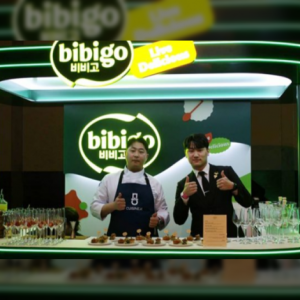[CJ Heritage] is a monthly column highlighting the evolution of CJ’s heritage and the best, the first, and the most unique corporate moments alongside modern Korean history

Every year in Korea, major companies seek to recruit talented candidates via ‘open recruitment’. While it is an opportunity for companies to meet talented applicants, it is also a time for applicants to prove themselves and develop their abilities. In fact, CJ was the first company in Korea to utilize an ‘open recruiting’ system. Going back to the very first day of this ‘open recruitment’ at CJ, this article showcases how Korea’s ‘open recruiting’ system was held in the past and explores how CJ developed a corporate culture that prioritizes employee talent like no other.
The Human Resource Academy that Developed a Group’s Talent
Korea’s first-ever ‘open recruiting’ session was held in 1957. At the time, referral recruitment, in which candidates were selected based on background factors such as their hometowns and personal connections, was more commonplace. In January of 1957, about 2,000 applicants gathered at the business department of Seoul National University, one of the most prestigious universities in Korea. Although the weather was extremely cold, with temperatures reaching a low of minus 15 C (5 F), the examination hall was filled with excited, young, talented individuals dreaming of joining the nation’s top company.
Two months prior to the recruitment exam, recruitment notices for CheilJedang and the trade · textile teams were posted on the notice boards of all universities. Lee Byung-Chull, the company’s founder, made the decision to recruit talented individuals without relying on the candidates’ backgrounds and personal connections. The ‘open recruitment’ system was sensational in Korea at that time, leading it to gain attention nationally.
The test consisted of written exams on English, general knowledge and completion of a thesis, followed by one or two rounds of interviews. After the results were released, a total of 27 successful candidates were recruited and received new hire training at their assigned company. Part of the training consisted of a three-month period of a field training program (FTP) conducted by CheilJedang. The new recruits started the program by carrying heavy sugar sacks in the sugar storage facility and learned how difficult fieldwork was.

Individuals who developed their talents at CheilJedang stood out in a variety of areas. When Cheil Industries was established, the factory director of CheilJedang, Kim Jae-Myung, played a key role in leading the establishment of Korea Fertilizer Industries. As CheilJedang grew, it provided a productive environment to grow the talent of its employees. Statistics show that nine percent of Samsung CEOs have come from CheilJedang in those days, proving that the company played a significant role in producing talented individuals.
CheilJedang has also gained a reputation as the best company in the industry offering a human resource program. It was among the few companies that operated an in-house sales college, leading it to earn a reputation of having “the best professional human resource training center.” One media outlet even labeled CheilJedang as the nation’s best ‘human resource academy’.
‘Employees are the most valuable assets a company has’ was the belief that the founder Lee Byung-Chull had. His perspective on talent still influences the company in many ways today. CheilJedang’s ‘open recruitment’ allowed the company to experience remarkable growth through the 1960s and led other companies to follow CheilJedang’s recruitment process.
As the size of the company grew, the number of employees also increased drastically. At the end of the 1960s, the company had less than 500 employees, before increasing to 1,200 in 1968 and by 1987, it exceeded 5,000 employees. The increasing number of employees also further developed the recruitment process, training and personnel management system.

In 1966, the promotion policy was established. Additionally, for the first time in the Korean food industry, the common industry standard of using two teams in twelve-hour shifts was changed to using three teams in eight-hour shifts. This change set the standard for companies across the industry, improving productivity and boosting morale in the process.
CheilJedang also improved its salary policy to close the gap between employees with different academic backgrounds and positions. In February 1996, right after the establishment of the group, the company introduced a new human resources system with the aim of helping all employees to become experts in certain fields. By integrating jobs that were previously operated differently and applying a new evaluation method, the system changed to one centered on individual abilities rather than giving priority based on age and seniority. The new human resources policy has become a system that not only improves morale but also rewards them based on their achievements.
Young Corporate Culture that Respects Autonomy and Creativity

CJ Corporation was also the first Korean conglomerate to change business formal attire to a business casual dress code in 1999 and implement a more horizontal organizational culture in 2000. The goal of the dress code policy was to create a young, future-oriented organization where different opinions could be freely spoken. Additionally, changing the dress code policy led to easing of the hierarchical culture, creating a more horizontal organizational culture in which all individuals are respected.
The Management Philosophy of ‘Talent First’
The biggest factor behind CJ Corporation’s evolution into a global lifestyle company was talented individuals. CJ has worked hard to cultivate talented individuals with integrity, passion and creativity, reflecting the core values of the company. This ‘talent first’ management philosophy was also reiterated in the mid-term vision announcement by CJ Corporation last year. “Top talent is the key to making everything else possible” stated CEO Lee Jay-hyun. “Through various opportunities and fair competition, we will create a workplace in which well-prepared ‘Hagojabi*’ can grow, flourish and reap unprecedented rewards for their excellent performance. We will make CJ a workplace that attracts the best talent and encourages these individuals to grow together in their efforts and achievements.”
*Hagojabi: a person who is eager to do anything, seeks out new challenges and accomplishes them enthusiastically











